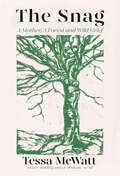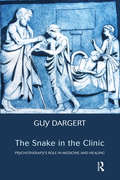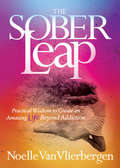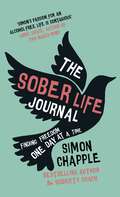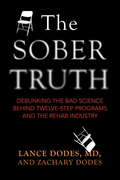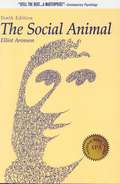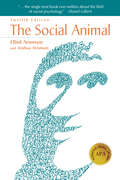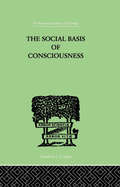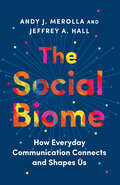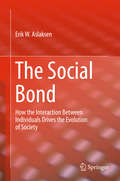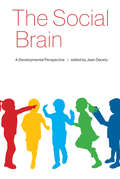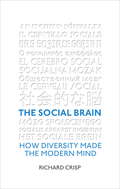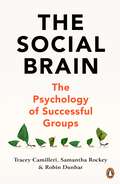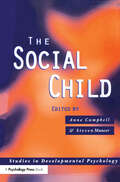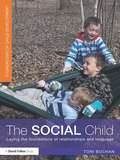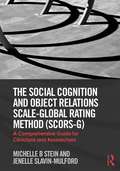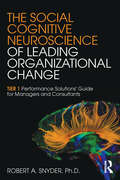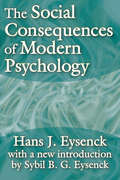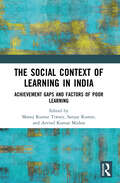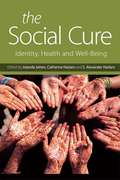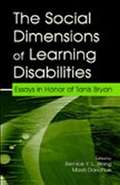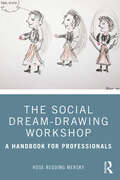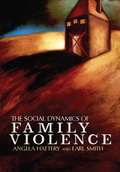- Table View
- List View
The Snag: A Mother, A Forest, and Wild Grief
by Tessa McWattIn her memoir The Snag, the acclaimed, award-winning author of Shame on Me, Tessa McWatt, takes on personal and collective grief, and the solace and inspiration to be found in connecting with nature—and each other.Every day, we hear about and experience griefs, large and small, in our families, friendships, communities, and worldwide. The grief of a loved one passing. The grief of a way of life ceasing to exist. The grief of global pandemic, war, climate collapse.As her mother&’s dementia advances and she can no longer live independently, Tessa McWatt confronts personal and political losses, and finds herself wandering in a forest asking, how do we grieve? And what can we learn from nature and those whose communities are rooted in nature about not only how to grieve but also how to live?From the newest seedling to the oldest snag in the forest, there is meaning to be found in every stage of a tree&’s life, all of which contribute to a thriving forest community. In this forest thinking, Tessa begins to find answers to her questions about how to live (for each other), how to grieve (radically), and how to die (with love and connection).The Snag is an essential book about living and dancing and singing and praying, even in the face of unimaginable sadness, and in this way, growing together and supporting one another, like the trees in the forest.
The Snake in the Clinic: Psychotherapy's Role in Medicine and Healing
by Guy DargertThis book is for psychotherapists and would make a wise companion for anyone starting out in the profession. It entreats readers to be mindful of symptoms, how not to confuse symptoms with illness and how both can be read as paths to the deeper reaches of the psyche where the cause of illness lies.
The Sober Leap: Practical Wisdom to Create an Amazing Life Beyond Addiction
by Noelle Van VlierbergenThe Sober Leap helps recovering addicts take their recovery to the next level. Millions of women enter recovery from alcohol addiction with one goal in mind: to stay sober. They&’re left to their own devices to &“figure it out&” from there, leaving them feeling lost, disenchanted, and susceptible to relapse. The Sober Leap invites recovering addicts to step into the light and thrive in recovery. Certified Health and Addiction Recovery Coach Noelle Van Vlierbergen provides practical wisdom to change the habits and behaviors that are holding readers back from showing up fully as a powerful, sober woman. With honesty and humor, Noelle shares her own experiences with recovery and introduces readers to eleven basic principles that will transform the mind, body, and soul. Reintroducing readers to the truths they&’ve always known, but lost along the way, The Sober Leap is a call to action to let go of the past, embrace the present, and finally start living the life you were meant to live.
The Sober Life Journal: Finding Freedom One Day At A Time
by Simon ChappleThe Sober Life Journal is an all-new format that captures the essence of journaling and provides space to grow and develop as you embark on a sober life. With hundreds of writing prompts, pages for reflection, focus, inspiration and guided exercises, this beautiful new journal supports your intention to create something lasting and meaningful to accompany you on your journey to an alcohol-free life.Every day is a new fresh page, and this journal gives you the time, the tools and the safe space you need to take things one step at a time as you journey one day at a time towards a life full of joy and freedom.
The Sober Life Journal: Finding Freedom One Day At A Time
by Simon ChappleThe Sober Life Journal is an all-new format that captures the essence of journaling and provides space to grow and develop as you embark on a sober life. With hundreds of writing prompts, pages for reflection, focus, inspiration and guided exercises, this beautiful new journal supports your intention to create something lasting and meaningful to accompany you on your journey to an alcohol-free life.Every day is a new fresh page, and this journal gives you the time, the tools and the safe space you need to take things one step at a time as you journey one day at a time towards a life full of joy and freedom.
The Sober Truth
by Zachary Dodes Lance DodesAn exposé of Alcoholics Anonymous, 12-step programs, and the rehab industry--and how a failed addiction-treatment model came to dominate America. AA has become so infused in our society that it is practically synonymous with addiction recovery. Yet the evidence shows that AA has only a 5-10 percent success rate--hardly better than no treatment at all. Despite this, doctors, employers, and judges regularly refer addicted people to treatment programs and rehab facilities based on the 12-step model. In The Sober Truth, acclaimed addiction specialist Dr. Lance Dodes exposes the deeply flawed science that the 12-step industry has used to support its programs. Dr. Dodes analyzes dozens of studies to reveal a startling pattern of errors, misjudgments, and biases. He also pores over the research to highlight the best peer-reviewed studies available and discovers that they reach a grim consensus on the program's overall success. But The Sober Truth is more than a book about addiction. It is also a book about science and how and why AA and rehab became so popular, despite the discouraging data. Dr. Dodes explores the entire story of AA's rise, from its origins in early fundamentalist religious and mystical beliefs to its present-day place of privilege in politics and media. The Sober Truth includes true stories from Dr. Dodes's thirty-five years of clinical practice, as well as firsthand accounts submitted by addicts through an open invitation on the Psychology Today website. These stories vividly reveal the experience of walking the steps and attending some of the nation's most famous rehabilitation centers. The Sober Truth builds a powerful response to the monopoly of the 12-step program and explodes the myth that these programs offer an acceptable or universal solution to the deeply personal problem of addiction. This book offers new and actionable information for addicts, their families, and medical providers, and lays out better ways to understand addiction for those seeking a more effective and compassionate approach to this treatable problem. From the Hardcover edition.
The Social Animal (10th edition)
by Elliot Aronson Joshua AronsonThis book is a brief, compelling introduction to modern social psychology. Through vivid narrative, lively presentations of important research, and intriguing examples, Elliot Aronson probes the patterns and motives of human behavior, covering such diverse topics as terrorism, conformity, obedience, politics, race relations, advertising, war, interpersonal attraction, and the power of religious cults.
The Social Animal (A\series Of Books In Psychology)
by Elliot Aronson Joshua AronsonA landmark text that maintains its relevance and unique approach edition after edition, The Social Animal offers a brief, compelling introduction to modern social psychology. Through vivid narrative, lively presentations of important research, and intriguing examples, Elliot Aronson probes the patterns and motives of human behavior, covering such diverse topics as terrorism, conformity, obedience, politics, race relations, advertising, war, interpersonal attraction, and the power of religious cults.
The Social Basis Of Consciousness: A STUDY IN ORGANIC PSYCHOLOGY Based upon a Synthetic and Societal
by Burrow, TrigantFirst Published in 1999. Routledge is an imprint of Taylor & Francis, an informa company.
The Social Biome: How Everyday Communication Connects and Shapes Us
by Jeffrey A. Hall Andy J. MerollaA deep dive into the importance of daily communication and how we can harness its power to create a better life We spend much of our waking lives communicating with others. How does each moment of interaction shape not only our relationships but also our worldviews? And how can we create moments of connection that improve our health and well-being, particularly in a world in which people are feeling increasingly isolated? Drawing from their extensive research, Andy J. Merolla and Jeffrey A. Hall establish a new way to think about our relational life: as existing within &“social biomes&”—complex ecosystems of moments of interaction with others. Each interaction we have, no matter how unimportant or mundane it might seem, is a building block of our identities and beliefs. Consequently, the choices we make about how we interact and who we interact with—and whether we interact at all—matter more than we might know. Merolla and Hall offer a sympathetic, practical guide to our vital yet complicated social lives and propose realistic ways to embrace and enhance connection and hope.
The Social Bond
by Erik W. AslaksenThis book is open access under a CC BY 4. 0 license. This authored monograph analyses the determining factors of societal evolution: the interaction between individuals and the resulting relationship, which the author calls the "Social Bond". The book aims at providing a better understanding of social dynamics and social interaction, and the author develops two models which provide interesting new insights. The target audience primarily comprises academics working in the field of social complexity and related fields, but the book may also be beneficial for graduate students alike.
The Social Brain: A Developmental Perspective
by Jean DecetyA range of empirical and theoretical perspectives on the relationship between biology and social cognition from infancy through childhood.Recent research on the developmental origins of the social mind supports the view that social cognition is present early in infancy and childhood in surprisingly sophisticated forms. Developmental psychologists have found ingenious ways to test the social abilities of infants and young children, and neuroscientists have begun to study the neurobiological mechanisms that implement and guide early social cognition. Their work suggests that, far from being unfinished adults, babies are exquisitely designed by evolution to capture relevant social information, learn, and explore their social environments. This volume offers a range of empirical and theoretical perspectives on the relationship between biology and social cognition from infancy through childhood.
The Social Brain: How Diversity Made The Modern Mind
by Richard CrispIs conflict caused by an inherently hostile human nature? Are efforts to promote peaceful co-existence fated to fail? Is the story of human history destined to play out a clash of civilizations?These are the questions framing contemporary debate over diversity, immigration and multiculturalism. The Social Brain provides an entirely new psychological perspective on this debate. It argues that diversity is critical to our very survival as a species; that contact with different cultures was, and is, the essential element that fuels our creativity, innovation and growth. It asserts that diversity was the key to our intellectual evolution and will be integral to helping us tackle the most pressing social, political and economic concerns of our time.The Social Brain ties the origins of the modern mind to the evolution of human society, and provides an entirely new insight into how we can harness the ingenuity and invention that reside within us all.
The Social Brain: The Psychology of Successful Groups
by Robin Dunbar Tracey Camilleri Samantha Rockey'A remarkable and important book . . . a highly accessible, timely and invaluable guide to anybody working in groups.' Prof Paul Gilbert OBE___________________________________________________How many people does the ideal team contain? How do groups bond, earn trust and forge shared identities? How can leaders build environments adaptable enough to respond to shocks and still enable people to thrive together? How can you feel close to people if your only point of contact is a phone or a computer?In The Social Brain leading experts from the worlds of evolutionary psychology and business management come together to offer a primer on great team working. They explain what size groups work and how to shape them according to the nature of the task at hand. They offer practical hints on how to diffuse tensions and encourage cooperation. And they demonstrate the vital importance of balancing unity and the need for different views and outlooks. By explaining precisely how the 'social brain' works, they show how human groups function and how to create great, high-performing teams._____________________________________'This wonderful book reminds us that businesses are also biological and social . . . It could not be more timely, wise and useful.' Margaret Heffernan, author of Wilful Blindness'Buy it for yourself and your colleagues. Essential reading.' Mark Earls, author of HERD
The Social Child (Studies in Developmental Psychology)
by Anne Campbell; Steven MuncerResearch in the field of human social development is moving at an astonishing pace. Within psychology, children's social behaviour has attracted interest from cognitive, social, clinical, and educational psychologists employing a wide variety of techniques that range from conversational analysis to experimental designs. Contributions have also come from beyond the domain of traditional psychology such as evolutionary theorists, behaviour geneticists, cultural anthropologists, and ethologists. This book aims to bring the reader to the cutting edge of this work by including original contributions from those in the very forefront of their discipline. Each contributor has spent years working in their specialist area and the authors have been given the freedom to argue for very different positions on the origins and sequence of children's social competence. The Social Child brings together controversial and sometimes conflicting positions on issues of central importance to society. It considers the likely impact of rising divorce rates and single parenting, how media images affect children's understanding and behaviour, how genes inform development, the role parents have, whether changing sex roles have had an impact on children's social interactions, and the sources from which children acquire behaviour. This book will be relevant to those interested in children's behaviour both professionally (social workers, teachers, educational psychologists, therapists, youth workers) and academically. It can also be used as a textbook for second and third year undergraduates and by postgraduates.
The Social Child: Laying the foundations of relationships and language
by Toni BuchanWhat helps babies and young children develop proficient social skills? How do children's early relationships and social interactions influence their future emotional resilience and wellbeing? The Social Child thoughtfully discusses the key principles of children’s social development alongside descriptions of everyday practice. It aims to provide the reader with a rich understanding of the social skills and relationships that children develop as well as their discovery of communication and language. The book explores the importance of developing genuine, trusted and reciprocal relationships with babies and young children and shows how a child’s intrinsic drive to be social can be nourished and supported. Throughout the book, the author emphasises the importance of play in developing children‘s relationships and language skills and aims to help practitioners to: understand the factors that can help and hinder fundamental social processes for babies and young children; create secure and unconditional psychological and physical environments for children to practice their emerging language and communication skills; reflect on their own teaching methods to heighten their receptiveness to children’s social attempts to communicate through effective observation and planning; engage with parents and carers to help support children’s learning at home whilst maintaining the values of the family; celebrate the uniqueness of each child and provide learning experiences that are appropriate for individuals with particular learning needs, be they physical, emotional or cognitive to ensure that every child has an equal opportunity to succeed. Emphasising the importance of understanding the theory that underpins children’s social development, this accessible text shows practitioners how they can use this knowledge to provide learning opportunities that nourish children’s emerging communication and social skills.
The Social Cognition and Object Relations Scale-Global Rating Method (SCORS-G): A comprehensive guide for clinicians and researchers
by Michelle Stein Jenelle Slavin-MulfordThe Social Cognition and Object Relations Scale-Global Rating Method (SCORS-G) is a clinician rated measure that can be used to code various forms of narrative material. It is comprised of eight dimensions which are scored using a seven-point Likert scale, where lower scores are indicative of more pathological aspects of object representations and higher scores are suggestive of more mature and adaptive functioning. The volume is a comprehensive reference on the 1) validity and reliability of the SCORS-G rating system; 2) in depth review of the empirical literature; 3) administration and intricacies of scoring; and 4) the implications and clinical utility of the system across settings and disciplines for clinicians and researchers.
The Social Cognitive Neuroscience of Leading Organizational Change: TiER1 Performance Solutions' Guide for Managers and Consultants
by Robert A. SnyderIn a very understandable, practical, and accessible manner, this book applies recent groundbreaking findings from behavioral neuroscience to the most complex and vexing challenges in organizations today. In particular, it addresses managing large-scale organizational changes, such as mergers and acquisitions, providing lessons and tactics that can be usefully applied to in many different settings. In addition to discussing successful practices, it also identifies the reasons that most past comprehensive, long-term change projects have failed and unmasks the counterproductive effects of the typical evolutionary or emotion-based attempts to change group and individual behavior, using neuroscience as its principal tool.
The Social Consequences of Modern Psychology
by Hans EysenckIn The Social Consequences of Modern Psychology Eysenck takes the position that social science has real substance, and its findings ought to be applicable to social problems of our times. Although there is little that scientists can do about war and its prevention, or about social unrest and upheaval, or about strikes and other confrontations, there are a number of questions to which we can give tentative answers. This book deals with some of these questions, and finds some of the answers.Eysenck begins with a look at a paradox of modern psychology. Experimental psychologists use strictly scientific methods to investigate what to many people seem trivial and sterile problems, yet some social psychologists, psychiatrists and psychoanalysts investigate what are clearly important and socially relevant problems, but use methods and theories whose scientific rigor is doubtful at best. This paradox is artificial and unnecessary. Methods of investigation and theories and concepts enable us to combine worthwhile problems and rigorous methods.The book takes a long look at a particular problem which Eysenck investigated in depth during his illustrious lifetime. This tour de force, by one of the magisterial figures of modern psychology, is written for people as well as about people. It is not a rehash of the voluminous writings of lawyers, poets, politicians, dramatists, historians, psychiatrists and others who have felt compelled to write about these psychological matters without even a smattering of psychological knowledge. It is, instead, based on empirical investigations that are too often declared to be nonexistent by publicists and politicos.
The Social Context of Learning in India: Achievement Gaps and Factors of Poor Learning
by Manoj Kumar Tiwary, Sanjay Kumar, and Arvind Kumar MishraWhy are children from disadvantaged and minority communities overrepresented among academic underachievers, poor learners, and school dropouts? This volume engages with this question and examines classroom learning as a process that involves a multitude of actors situated in specific social, cultural, and historical contexts. The volume covers an interdisciplinary spectrum of educational processes, contexts, educational ambitions, and limitations of low-caste, working-class, and middle-class students from different Indian communities and regions. The volume delves into the problem of academic underperformance from a social identity perspective and probes into social context-based variability in classroom learning, systemic disadvantages in the form of negative stereotypes, and the family as an under-studied social group in all discussions of schooling. It also examines the teachers’ perceptions and attitudes towards Adivasi students and other minority groups in primary schools and their effect on children’s classroom engagement. The chapters in this volume provide insights into unresolved and critical research questions that require the attention of teachers, school management, educators, and policymakers alike. This book will also be useful for academicians, policymakers, teacher educators, pedagogic practitioners in India and abroad, and state and central government institutions working on school education, educational psychology, policymaking in education, learning methods, and research on educational enhancement.
The Social Cure: Identity, Health and Well-Being
by Jolanda Jetten S. Alexander Haslam Catherine HaslamA growing body of research shows that social networks and identities have a profound impact on mental and physical health. With such mounting evidence of the importance of social relationships in protecting health, the challenge we face is explaining why this should be the case. What is it that social groups offer that appears to be just as beneficial as a daily dose of vitamin C or regular exercise? This edited book brings together the latest research on how group memberships, and the social identities associated with them, determine people’s health and well-being. The volume provides a variety of perspectives from clinical, social, organisational and applied fields that offer theoretical and empirical insights into these processes and their consequences. The contributions present a rich and novel analysis of core theoretical issues relating to the ways in which social identities, and factors associated with them (such as social support and a sense of community), can bolster individuals’ sense of self and contribute to physical and mental health. In this way it is shown how social identities constitute a ‘social cure’, capable of promoting adjustment, coping and well-being for individuals dealing with a range of illnesses, injuries, trauma and stressors. In addition, these theories provide a platform for practical strategies that can maintain and enhance well-being, particularly among vulnerable populations. Contributors to the book are at the forefront of these developments and the book’s strength derives from its analysis of factors that shape the health and well-being of a broad range of groups. It presents powerful insights which have important implications for health, clinical, social and organisational psychology and a range of cognate fields.
The Social Dimensions of Learning Disabilities: Essays in Honor of Tanis Bryan
by Mavis Donahue Bernice Y. L. WongEssays discussiing the social aspects of Learning Disabilities
The Social Dream-Drawing Workshop: A Handbook for Professionals
by Rose Redding MerskyThe Social Dream-Drawing Workshop is a pioneering, practical guide for professionals who work with people going through major life transitions, such as career change, relocation or bereavement. These transitions can evoke enormous feelings of uncertainty and are times of vivid dreaming. Social Dream-Drawing is a highly effective method of group work that mobilizes the dream’s enormous capacity to help us adapt to life, whatever challenges it throws at us. This user-friendly book explains the underlying key concepts and basic steps of the Social Dream-Drawing method, from sharing dream drawings in a group environment to running digital sessions. It shows how working with these expressive drawings can bring an otherwise internal experience out into the open and serve as lifelong mementos of key times in our lives. Including drawings and testimonials from workshop participants and guidance on creating a safe and supportive environment, The Social Dream-Drawing Workshop will appeal to therapists and counsellors as well as social workers, coaches and anyone interested in exploring this fascinating practice.
The Social Dynamics of Family Violence
by Angela Hattery Earl SmithHattery (sociology, George Mason U.) and Smith (sociology and American ethnic studies, Wake Forest U.) introduce sociology students to family violence in the US throughout the life cycle, with specific focus on its social character and institutional causes. They discuss physical and sexual child abuse, elder abuse, intimate partner violence, and violence in subgroups like gay and lesbian families and military families, and provide theoretical frameworks and methods used to study it. They address the role of social institutions and structures like the economy and religion and explore variations across family groups, including differences in race and ethnicity, social class, and sexuality, and prevention and avoidance strategies, and criminal justice, social service, and legal responses. Annotation ©2012 Book News, Inc. , Portland, OR (booknews.com)
The Social Dynamics of Family Violence
by Angela Hattery Earl SmithThis compelling new text explores family violence throughout the life course, with special attention to the social character and institutional causes of family violence. From child abuse and neglect to intimate partner violence and elder abuse, Hattery and Smith ask students to consider how social inequality, especially gender inequality, contributes to tensions and explosive tendencies in family settings. Students learn about individual preventative measures and are also invited to question the justice of our current social structure, with implications for social policy and reorganization. Hattery and Smith pepper the text with evocative case studies from their own research and illuminating stories published in mainstream media. Unique coverage of same-sex couples and multicultural couples, as well as of theory and methods, make this text an essential element of any course considering the sociology of family violence.
